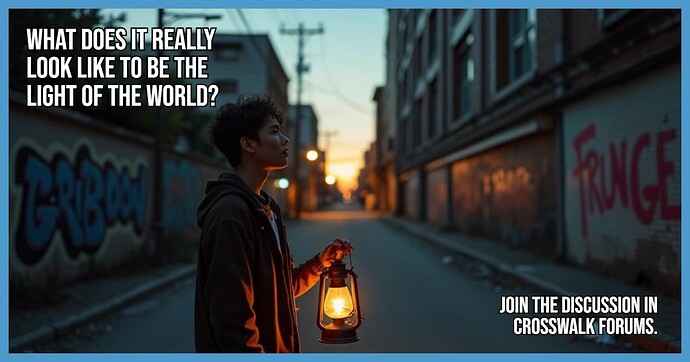Fritz,
Not to overburden the metaphor, but I’d like to “shine some light” on some of these premises you mentioned.
You pointed us to Whitney Hopler’s opinions on Matthew 5:14-16, but I find some small inconsistencies with the conclusions she draws from this revelation.
First, she affirms “Your life reflects the reality of God’s hope in a world that desperately needs it” but then contradicts herself by making it conditional on our efforts by adding “*as long as you let your light shine by living out your faith.*” suggesting it depends on us.
Then she makes the same contradiction again when she tries to explain what she reads as “letting your light shine before others” means. First she says: “It means living out your faith in ways that show people God’s light shining through your life” and then contradicts herself by adding: “If you do your best to live a holy life, people will see God’s light shining through you." Then she adds some ways in which Christians should behave in order to "shine: "Spend time in prayer, read God’s Word, and seek to understand how God wants you to live. As you do, God’s Holy Spirit will empower you to live in a way that naturally reflects God’s light”. This idea. to me, is eisegesis.
Here’s my point. You correctly point out that “Jesus didn’t say “try to become light.” He said we are the light. That identity isn’t based on personality or platform—it’s a result of Christ living in us. Our job isn’t to manufacture brightness but to remove the bowl we’re hiding under.”. But then you go on to suggest ways in which we should “remove the bowl we’re hiding under” essentially instructing us to “manufacture brightness”.
I want us to read the word clearly, exegetically, and not imply ideas that are not contained in the passage. I hope you’re with me here.
The first implied idea for us to avoid, you already pointed out. “Jesus didn’t say “try to become light.” He said we are the light.”. You are reading exegetically here. After shocking the disciples with an extreme paradigm shift, explaining heaven’s understanding of true blessing, he reveals to them who they are in this blessing; He reveals to them that they have been made “lights”. He attributes this making to God the Maker of Light by explaining (paraphrased for clarity), “Just like a city, set on a hill cannot be hidden, your new light also cannot be hidden. Just as no one would light a candle and then put a basket over it, God didn’t do that with you either. He made you a bright lamp and then set you out on a “lampstand” so to speak, because that is the purpose of lighting the lamp in the first place. You are correct in pointing out that we are NOT instructed to try to become light, or to try to shine.
Then comes V16. The implied idea to avoid here is that we are to somehow volitionally “shine our light”. This is an implied idea that many erroneously add to the text here; we even write little songs about our obligation to shine, and to remove our baskets. None of that is actually in this text. What IS in the text, and what should NOT be overlooked (although it often is), is the little word hoútō, οὕτως; rendered, “so”, “in this manner”, “in such a way”. Too often this word, and the following idea is omitted from our admonishments to “let your light shine”. The complete idea is, “You ARE a light! Intentionally direct that light in such a way that others see, and glorify GOD, and not you!” The meat of the message is not an admonishment to “shine”, but to live in such a way that God is noticed and you are not. That is the reason for lighting the lamp in the first place. I don’t sing the little ditty “this little light of mine, I’m gonna let it shine” because it is wrong in so many places; it is not “my light” and I don’t let it sine" (I don’t sing the next verse either, for the same reason).
Lamps and salt share something in common. They are both the unnoticed reason something else is noticed. No one is supposed to notice the lamp, but what the lamp is illuminating; no one is supposed to notice the salt, but the salt is supposed to enhance the natural flavor of the food.
Mark adds “Have salt in yourselves, and have peace with one another.” (9:49)
and so I affirm..
Pax
KP
